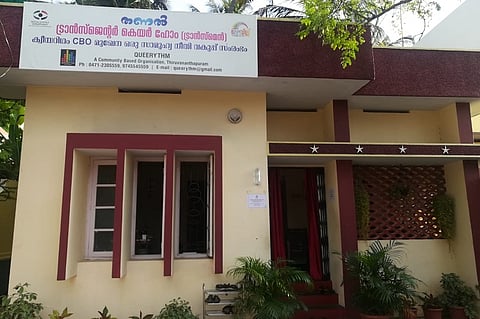

It’s a quiet weekday afternoon. Prijith parks his scooter outside and walks up to the house, crossing a lovely garden. Thanal: Transgender Care Home (Trans Men), says the board outside. It’s chocolate brown and cream like a fairytale house, standing above the others, between the Goethe Zentrum and the three way junction in Kunnukuzhy, Thiruvananthapuram. The government of Kerala has made Queerythm, a welfare association for LGBTIQ+ people, in charge of the home which was launched a little more than three months ago. It is the first short stay home for trans men in the state.
“We have arranged the place to accommodate 25 people at a time. But so far, in more than three months, only 10 trans men have come to us,” says Prijith, founder of Queerythm, who lives nearby. Queerythm is one of the community-based organisations that the Social Justice department chose as part of its Mazhavillu project for opening transgender care and short stay homes.
“Mudra, another CBO, was put in charge of the transgender home in Ernakulam. That’s for trans women. Five such homes are planned as part of the project – four for trans women, and one for trans men. Another one will be opened for trans women in Thiruvananthapuram, and Oasis Cultural Society will be in charge of it. In Kottayam, it will be Dhwani, and in Kozhikode it will be Snehakoodu,” Prijith says.
He finds it surprising that so few trans men have come seeking shelter three months after the opening. Incidents of trans people in crisis have been plenty in the state with the stigma against the community persisting despite efforts to mitigate it. Perhaps it is Kerala’s transgender policy of 2015 that’s made life easier for the community, Prijith reckons. Or perhaps it’s because few have heard of the home.
As he talks, a trans man walks out of the house, exchanging a few words with Prijith. Hearing voices, Shine Rahman comes to the door. He is one of the two caretakers of the home. “All the seven staff are community members – the manager, the caretakers, the cleaning staff, the security and the cook,” Prijith says.
Shine introduces two trans men who are temporarily staying at the home. Both escaped from crisis situations. None of the stories of the trans people who come there surprise Shine, he says. “I have been through the same difficult paths myself. It’s always the family not accepting you. I have been told to bear it all and live, and I want to ask them how.”
The two trans men don’t mind sharing their stories. But it is nearly the same as what every trans person in a crisis may have to tell you, they say. One of them is from Idukki, a 20-something, who had once thought he will go to America and "become a man". He wore his brother’s clothes and tried to tell his mother his plans. No one took him seriously till marriage proposals began coming in and he had to run away. By then, he was aware of the community, he had heard of Mudra, and from them, of Thanal. He rushed to Thiruvananthapuram and the family pursued him. There were tears and promises, but he refused to go with them. He also cropped his hair so short that the family didn’t want him to appear in front of others.
Next to him sits the other trans man, a postgraduate. He doesn’t talk much, but says that it is a clash with his brother that brought him here from Thrissur. His parents accepted him, he had even been encouraged to wear men’s clothes. But, the brother couldn’t. “It’s always the brothers who find it hard to accept trans men,” agrees Shine. The trans man from Idukki nods along. There has to be a psychological reason to it, Shine says.
Prijith is also part of the conversation, knowing their tales all too well, having to coordinate with the families, and doctors and counsellors. Awareness is obviously the only way out, but it’s not easy. “What will society say is their problem, more than accepting their child,” Shine says.
It wasn’t easy finding a building either, Prijith says. “We got this with the support of ward councillor IP Binu,” Prijith shares. He is not sure what should be done if the trans men who come there do not have a place to go to. The home is temporary, meant for three months in all. The government has plans to give vocational training, help them get jobs. But everything takes time, especially the official processes. Till then they can stay peacefully in the six rooms of the house, among people who can empathise.